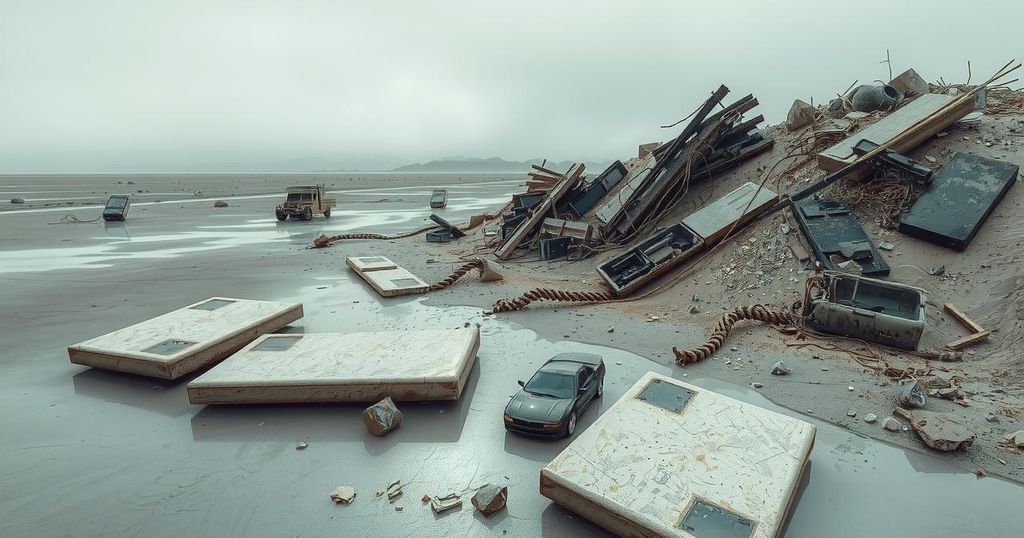Residents of Niger State Struggle With Flood Aftermath and Decaying Odor

In Mokwa, Niger State, residents are plagued by the stench of decaying corpses following devastating floods that killed an estimated 200 people. Flood victims remain unfound, raising health concerns. Government aid includes N2 billion pledged for rehabilitation, though locals are calling for immediate action to handle the situation as recovery efforts continue.
In the wake of catastrophic floods that hit Niger State, particularly Mokwa Local Government Area, residents are grappling with an unbearable odor. This foul smell, they believe, is emanating from the decaying corpses of flood victims still buried under sand and debris, nearly two weeks post-disaster. The unpleasant scent serves not just as a painful reminder of the tragedy but poses serious health risks.
The floods on May 28 and 29 tragically claimed about 200 lives as they swept through the area. According to the Niger State Emergency Management Agency (NSEMA), the floods displaced more than 3,000 people, destroyed over 50 homes, and left 161 bodies recovered thus far. As the waters receded, the agency announced ongoing efforts to manage the recovery of deceased victims and debris from the disaster.
Residents like Esther Nwanosike are deeply troubled by the stench, particularly as she runs a food stall in the area. She expressed her concerns, saying, “The smell is overwhelming, and I am concerned about the potential health implications. My customers complain they can’t breathe well due to the stench. The government needs to take action on this issue before we all fall ill. They should plan to fumigate this area to stop this bad odor.”
Alhassan Kolo echoed similar sentiments, highlighting the distressing reality that many corpses have become unrecognizable. “Honestly, some of the bodies we recovered, you can’t even recognise them anymore because they are decaying,” he stated. Another resident, Ahmed Yusuf, lamented the difficulties of living with such a pervasive odor. He called on the government to act swiftly, voicing worry that more bodies remain unfound.
Despite the government’s response, with Vice President Kashim Shettima pledging N2 billion for rehabilitation and assistance to flood victims, many residents feel the urgent need for immediate action. Salihu Ishaq described the severity of the situation, sharing that many of those displaced are unwilling to go to the camps set up by the government. He has lost family members to the disaster and noted, “We have buried more than 70 and we are still searching for more corpses.”
Amina Abubakar shared her heart-wrenching story, having lost a sister and three children in the floods. She implored government officials to respond quickly, stating, “The government should come in immediately; it is very urgent.” The Ministry of Secondary and Tertiary Health has acknowledged the concerns about the stench, with Idris Ibrahim assuring that a team is addressing the situation.
As recovery efforts continue, NSEMA has confirmed that as of June 4, the total death toll stands at 161, with ongoing efforts to retrieve remaining bodies. Manzo Ezekiel from the National Emergency Management Agency (NEMA) stated that comprehensive recovery efforts are underway, including health assessments in the wake of the flood.
Niger State’s Governor, Mohammed Bago, shared insights on the possible origins of the floodwaters, suggesting they may have flowed from outside Nigeria, potentially from the Niger Republic. He noted the unusual severity of this year’s season, with reservoirs at capacity. Governor Bago underscored the urgency of relocation efforts for those living in flood-prone areas, emphasizing that climate change demands robust intervention from the Federal Government.
The situation in Mokwa is dire, with the lingering stench from decaying corpses causing health concerns among residents. With significant government pledges for rehabilitation, locals are still reeling from losses and calling for swift action to address the mess left behind. Ongoing efforts to recover bodies and assess health risks are crucial as the community navigates this tragedy.
Original Source: punchng.com







